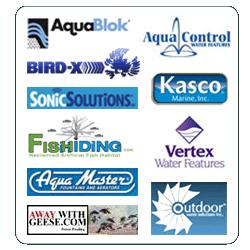Home > Products and Services > Chemical Control
Chemical Control
Call our office to schedule treatments for problematic vegetation that prevents you from enjoying your lake/pond. We are licensed & insured as an aquatic
pesticide applicator so we can treat all types of vegetation by using chemicals specifically registered for use in ponds and lakes. A chemical manage-ment program
provides you with a pristine-looking aquatic environment.
Service Options:
- Annual contracts for year-round service
- Seasonal service based on the growing season, February-November
- One-time targeted aquatic weed control treatments
Do I have a problem?
The presence of aquatic plants does not necessarily indicate a problem needing corrective measures. A problem arises for homeowners when plants interfere with recreational activities such as swimming, boating, and fishing. Exotic plants have the additional effect of displacing native plant species, interfering with the food chain, and reducing fish populations. Proper identification of aquatic plants is the first step in understanding how to manage problem plants in a lake.
Controlling the vegetation of a lake can create unexpected management issues. Manipulating one component of a lake ecosystem has consequences for other components of the lake. For example, population growth of microscopic small green algae and macrophytes (large leafy plants and large plant-like algae) are inversely related. Lakes with abundant algae and poor water clarity generally have fewer submersed macrophytes. However, management efforts that reduce algae often result in increased growth of the remaining macrophytes. Removing the remaining macrophytes increases the effects of wind turbulence and redissolves nutrients in the sediments into the water. This results in an algal bloom, which turns the water green and has the opposite of the desired effect. The trade-off is clear water with abundant submersed macrophytes versus an algae bloom with low water clarity and few macrophytes.
The goals of a management plan should be clearly identified in advance. The expectation of a perfectly clear, vegetation- and algae-free lake is unrealistic, and leads to disappointing results. Shorelines with muddy substrates need aquatic vegetation to prevent suspension of the soil into the water. Sandy shorelines, although preferred by lakefront owners, are only one of many types of shorelines.
Applying Aquatic Herbicides: Yourself or Pay Someone?
Written By: Bill Lynch, Program Specialist, OSU Natural Resources
Ohio pond owners can apply aquatic herbicides themselves, and need not pay a certified pesticide applicator to do it. That's not the case in many other states, where the pond owner must pay a commercial applicator if he/she wishes to control nuisance aquatic plants.
Are there instances where it is wise to pay a licensed applicator to treat aquatic vegetation? Sure there is? Not all pond owners feel comfortable handling chemicals safely. Chemicals can be dangerous and accidents do happen. These folks should consider paying a commercial applicator. Commercial applicators are trained to handle chemicals safely and must be re-certified every three years in Ohio. This same advice applies to the application of terrestrial herbicides around the house.
Misidentification of the problem plants can lead to additional costs because the wrong product was used or not enough of the correct product was used. A licensed aquatic herbicide applicator can almost always ID the plants correctly and determine what to use and how much.
Another instance a commercial applicator may be "worth their weight in gold" is if it is difficult to calculate the volume of a pond. Poor math here can cost big dollars! Many pond owners treating their own pond grossly underestimated the pond's volume, and therefore under-apply the product chosen. No control is achieved. Commercial applicators are quite efficient at making those volume determinations.
In reality, the pond owner should ask themselves the following questions when considering whether or not to apply an herbicide themselves:
- Am I willing to take the time to read product labels, making sure to pay close attention to warnings, safety instructions, and restrictions?
- Am I able to correctly identify the plants causing the problem?
- Can I accurately calculate the amount of product required to do the job?
- Do I have the proper application and safety equipment to apply the herbicide?
- Do I really feel comfortable handling chemicals?
A no answer to any question should cause the pond owner to consider a licensed applicator. Two no answers and the owner should pick up the phone and call a licensed, commercial applicator.
DISTRIBUTOR




